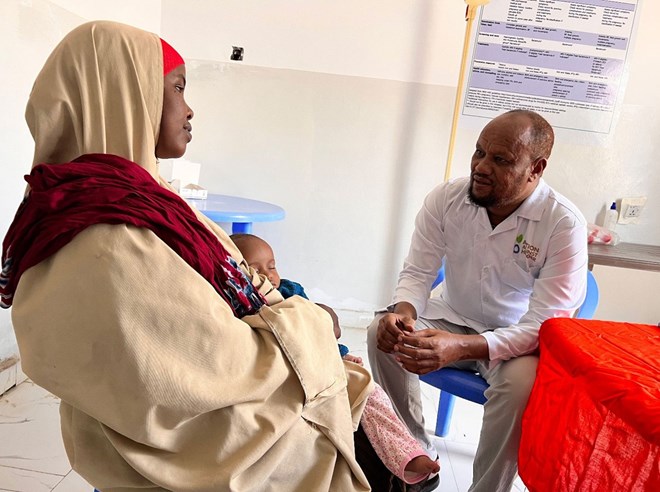
Wednesday June 12, 2024
 Mrs Abdia Adan and her son Mohamed at Garasbaley Health Centre, Kahda district, during his final follow-up appointment to check on his condition. Photo credit: Action Against Hunger/Ahmed Issac
Mrs Abdia Adan and her son Mohamed at Garasbaley Health Centre, Kahda district, during his final follow-up appointment to check on his condition. Photo credit: Action Against Hunger/Ahmed Issac
Mogadishu, Somalia – Abdia Adan returns to Garasbaley Health Centre, in the heart of Kahda district, Banadir Region, for her 8-month-old son’s final follow-up at the facility. This visit proves different from her previous encounters as young Mohamed Hussein is now healthier. Abdia visited the health centre with Mohamed in November 2023 when he had a fever and was vomiting. His condition has significantly improved since the doctors diagnosed him with pneumonia and malnutrition, thanks to Abdia’s love and the attentive quality medical care received at the facility.
Living in the Sodonka camp in Kahda, a district in Mogadishu inhabited mainly by people affected by Somalia’s prolonged drought crisis of 2022–2023, Abdia’s family has faced numerous challenges. Her husband’s meagre earnings as a teacher are barely enough to sustain their family of 7. There are more than one million people sharing the fate of being displaced from their areas of origin into internally displaced camps in Mogadishu due to conflict, drought and floods. The living conditions in the camps are harsh, and limited access to basic services, such as water, sanitation, food and health services, increases the risks of disease outbreaks and malnutrition.
To address the critical issue of disease outbreaks, severe acute malnutrition and improve access to health and nutrition services, the WHO in Somalia initiated an emergency response, working with Action Against Hunger, an international NGO, and as well as the Juba Foundation, a local partner in Lower Shabelle Region. The joint venture was made possible thanks to generous and timely support provided by the Central Emergency Response Fund (CERF).
The emergency response was successfully implemented. Disease surveillance teams, community health workers, and health centres played crucial roles in delivering life-saving health and nutrition interventions. Working together enabled WHO and Action Against Hunger to avoid service duplication and smooth referral between community and facility-based care. More vulnerable people were reached in the targeted districts through complementary interventions, leverage of resources and knowledge sharing.
Garasbaley Health Centre, where Abdia had brought her ailing son, is one of the facilities that was supported by the project. Over her 4 years of living in the camp, Abdia knew the community health workers serving her neighborhood and had seen them refer sick children to nearby facilities like Garasbaley Health Centre, giving hope to families.
The project supported dedicated disease surveillance teams and community health workers and improved the availability of services at Garasbaley Health Centre, as well as other facilities. As a result, young Mohamed received the necessary medical attention and care, including amoxicillin, paracetamol, vitamin A, and ready-to-use therapeutic food, leading to his improved health and well-being.
The project’s impact extended beyond Abdia’s family and reached almost 15,000 people affected by drought in the Banadir, Bay and Lower Shabelle regions, with the provision of essential health and nutrition services in health facilities, such as outpatient consultations, safe delivery services, vaccination, antenatal care (ANC) and postnatal care (PNC), nutrition support, as well as mental health and psychosocial support.
The story of Mohamed and his family shows the importance of collaborative efforts among partners, community engagement, and access to quality health care and nutrition services in crisis-affected regions. It highlights the positive outcomes that can be achieved when organizations like WHO and Action Against Hunger work in partnership with local communities and stakeholders to address the urgent needs of vulnerable populations.